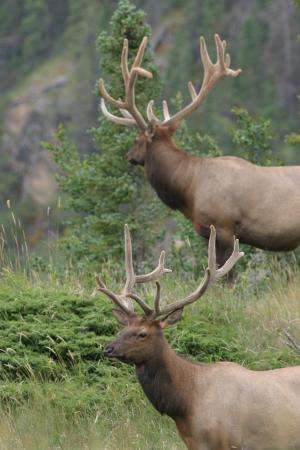Human impacts on natural world underestimated, new research says

A comprehensive five-year study by University of Calgary ecologists – which included monitoring the activity of wolves, elks, cattle and humans – indicates that two accepted principles of how ecosystems naturally operate could be overshadowed by the importance of human activity.
"Understanding the significance of the impact that humans have on ecosystems is a critical component in formulating long-term and effective conservation strategies," says principal investigator Marco Musiani.
"Our results led us to believe that ecologists have underestimated the impact of humans on natural food chains. The data we collected shows that humans are deliberately or inadvertently engineering ecosystems regardless of whether they would be naturally pre-disposed to top-down or bottom-up effects. Even in protected areas, the influence of humans might be greater than we previously thought."
Ecologists have long debated whether natural ecosystems and associated food chains are primarily regulated by predators or by the productivity of plant species, called top-down and bottom-up effects, respectively. With most of the world's ecosystems now dominated by humans, researchers from the University of Calgary sought to understand how much people influenced food chains in southwest Alberta.
Lead author Tyler Muhly, PhD, said the study – a collaboration between NSERC, Shell Canada, Parks Canada, the Alberta Government and the Universities of Alberta and Calgary– relied upon dozens of high-tech animal tagging devices and motion sensor-activated cameras to study human, animal and plant distribution throughout southwest Alberta. The research area stretched from Calgary in the northeast, through to the provincial borders with British Columbia in the west and the US-Canada border in the south.
"We painstakingly monitored wolves, elk, cattle and plant species, as well as humans for five years. We evaluated how these species interacted across the landscape and ultimately found that humans dominated the ecosystem," Muhly says.
"In particular, we found that forage-mediated effects of humans (bottom-up effects) were more influential than predator-mediated effects in the food chain. The presence of humans was most correlated with occurrence of forage (plants). Elk and cattle distribution correlated closely with forage, and the distribution of wolves matched that of the elk and cattle they view as potential prey.
"Our results contrast with research conducted in protected areas that suggested food chains are primarily regulated by predators. Rather, we found that humans influenced other species in the food chain in a number of direct and indirect ways, thus overshadowing top-down and bottom-up effects." Muhly says.
The results of this study will be published online in PLoS ONE on May 8.
Journal information: PLoS ONE
Provided by University of Calgary















